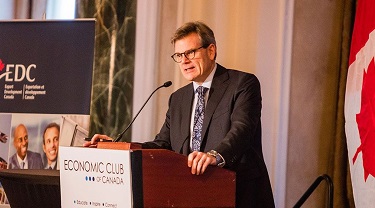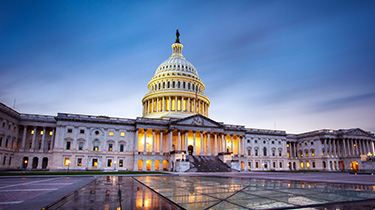

MyEDC account
Manage your finance and insurance services. Get access to export tools and expert insights.
Solutions
By product
By product
By product
By product
Insurance
Get short-term coverage for occasional exports
Maintain ongoing coverage for active exporters

Learn how credit insurance safeguards your business and opens doors to new markets.

See how portfolio credit insurance helped this Canadian innovator expand.
Guarantees
Increase borrowing power for exports
Free up cash tied to contracts
Protect profits from exchange risk
Unlock more working capital

Find out how access to working capital fueled their expansion.
Loans
Secure a loan for global expansion
Get financing for international customers
Access funding for capital-intensive projects

Find out how direct lending helped this snack brand go global.

Learn how a Canadian tech firm turns sustainability into global opportunity.
Investments
Get equity capital for strategic growth

Explore how GoBolt built a greener logistics network across borders.
By industry
Featured

See how Canadian cleantech firms are advancing global sustainability goals.

Build relationships with global buyers to help grow your international business.
Resources
Popular topics
Explore strategies to enter new markets
Understand trade tariffs and how to manage their impact
Learn ways to protect your business from uncertainty
Build stronger supply chains for reliable operation
Access tools and insights for agri-food exporters
Find market intelligence for mining and metals exporters
Get insights to drive sustainable innovation
Explore resources for infrastructure growth
Export stage
Discover practical tools for first-time exporters
Unlock strategies to manage risk and boost growth
Leverage insights and connections to scale worldwide

Learn how pricing strategies help you enter new markets, manage risk and attract customers.

Get expert insights and the latest economic trends to help guide your export strategy.
Trade intelligence
Track trade trends in Indo-Pacific
Uncover European market opportunities
Access insights on U.S. trade
Browse countries and markets
Get expert analysis on markets and trends
Discover stories shaping global trade
See what’s ahead for the world economy
Monitor shifting global market risks
Read exporters’ perspectives on global trade
Knowledge centre
Get answers to your export questions
Research foreign companies before doing business
Find trusted freight forwarders
Gain export skills with online courses
Discover resources for smarter exporting
Get insights and practical advice from leading experts
Listen to global trade stories
Learn how exporters are thriving worldwide
Explore export challenges and EDC solutions
About
Discover our story
See how we help exporters
Explore the companies we serve
Learn about our commitment to ESG
Understand our governance framework
See the results of our commitments
MyEDC account
Manage your finance and insurance services. Get access to export tools and expert insights.

Lynn Côté is Export Development Canada’s (EDC’s) lead on its cleantech team, which is dedicated to helping promising Canadian cleantech companies grow and succeed internationally.
In this blog post:
I feel a certain sense of satisfaction with the arrival of Cleantech Week during the last week of November, because it signifies just how far the sector has come. Although it’s been talked about since the 1990s and is still in many ways a fledging industry, Cleantech Week showcases not only the innovation, growth and future drive of Canada’s cleantech companies, but also the growing public and private commitment to support the industry.
I had the opportunity to attend the kick-off breakfast for EDC’s Cleantech Export Week, and found the presentations insightful and inspiring. These are important messages, so I thought I’d share a summary of what was said here.
EDC President and CEO Benoit Daignault kicked off the event by urging Canadian exporters and their partners alike to see it as a “call to action.” Under the broad theme of ‘Growing Canada’s Share of the Global Market for Cleantech,’ he said EDC launched the week to highlight the opportunities open to Canadian cleantech companies. The event attracted stakeholders from government and industry and featured an energized talk from François-Philippe Champagne, Canada’s Trade Minister.
“We believe cleantech will be a cornerstone opportunity of the future economy,” Daignault said. He added that, “Total worldwide investment in cleantech has reached $US1 trillion. By 2020, that total is expected to rise to $2.5 trillion. There’s a lot of demand and we need to ensure the supply is there. We see innovators, entrepreneurs and investors as part of the response.”
Daignault explained that cleantech is big business. He estimated Canada has 850 companies in the sector and their revenues is more than $13 billion for the industry as a whole. Of those, 80 percent have business outside Canada, with products ranging from power generation, energy grids, sustainable agriculture, water management and sustainable transport.
Champagne, meanwhile, told the group his government sees cleantech as a huge industry, particularly when it comes to exports.
“For me, it’s a golden opportunity,” Champagne said. “Globally, people need our cleantech [solutions]. When you travel, you hear it — whether it’s air purification, water purification, wastewater treatment.”
Champagne acknowledged that competition in the sector is steep, but said that the Canada brand has never been stronger.
He noted that one of his challenges is to convince Canadian exporters that the U.S. isn’t their only market. “We need to talk about the next frontier.”
Champagne noted that access to capital is one of the biggest challenges he hears from exporters. And there’s an issue of scale, which led him to suggest breaking down export markets into smaller, more manageable regions.
“We need to look at subnational levels,” he said. “I think small companies need to seize the moment.”
Often dubbed “Canada’s chief marketing officer,” Champagne said that when he’s selling Canada abroad, he doesn’t refer to it as a country with a population of 35 million, but as a country that, thanks to multiple free trade agreements, has preferential access to 1.2 billion customers worldwide.
EDC spotted the cleantech opportunity early on and made the sector a priority in 2012. Since then, we’ve helped more than 170 companies export to 114 countries for a total of $3.5 billion worth of financial support across our product lines including expansion loans, performance bonding and credit insurance.
Representatives from two such companies sat on a panel at the kick-off event. The first, Xebec Adsorption Inc., which sells hydrogen purification and renewable natural gas equipment, sold only to Canada and the U.S. for much of its 21-year history. Today, it sells to more than 60 countries.
“Cleantech is a hard business,” said President and CEO Kurt Sorschak. “You need a lot of perseverance and financial stamina. Everything takes longer and costs more than you anticipate.” He advised that a solid product and skilled workers are needed.
Sorschak also urged cleantech exporters to get to China fast. His fellow panelist, Daryl Wilson, President and CEO of Hydrogenics, agreed.
Wilson, whose company manufactures hydrogen generation and fuel-cell products, remembers when he wasn’t selling to China. “Two-and-a-half years ago, we realized the Chinese government was migrating policy in favour of clean technology and we had a solution. We turned to the folks at EDC and the Trade Commissioner Service [TCS] and started making trips to China. Fifteen trips later, we’re very happy with our success there.”
Canada’s Chief Trade Commissioner Ailish Campbell said the Chinese are throwing “every tool in the toolkit” at cleantech.
“We need a Team Canada approach to compete,” Campbell said. “Trade is a team sport.”
All in all, the Cleantech Week kickoff was an inspiring morning. One message is clear: there’s never been a better time for cleantech, now that the whole of government is on board. We are working in lockstep with the TCS, Business Development Bank of Canada and Sustainable Development Technology Canada to support this vibrant and growing sector.
EDC has been prioritizing cleantech for five years and we understand the ecosystem, which allows us to deploy our support solutions in the most effective way.
If you have questions about how EDC can help your cleantech company grow internationally, please don’t hesitate to reach out to us.
Cleantech opportunities are sweeping the globe, and our webinar, Clean Up with Cleantech Exports, give you the knowledge you need to overcome challenges, scale up, and grow your business internationally.

Keep track of the international markets that matter to your business. Get the latest financial and macroeconomic information for both developed and emerging markets.
Commodity prices can impact exporting, global trade and your business, so it’s important to be prepared for the challenges ahead.

Save time and money while accelerating your market diversification journey

India offers compelling opportunities for Canadian companies across a variety of sectors.

Insights and analysis from EDC on navigating the U.S. business environment